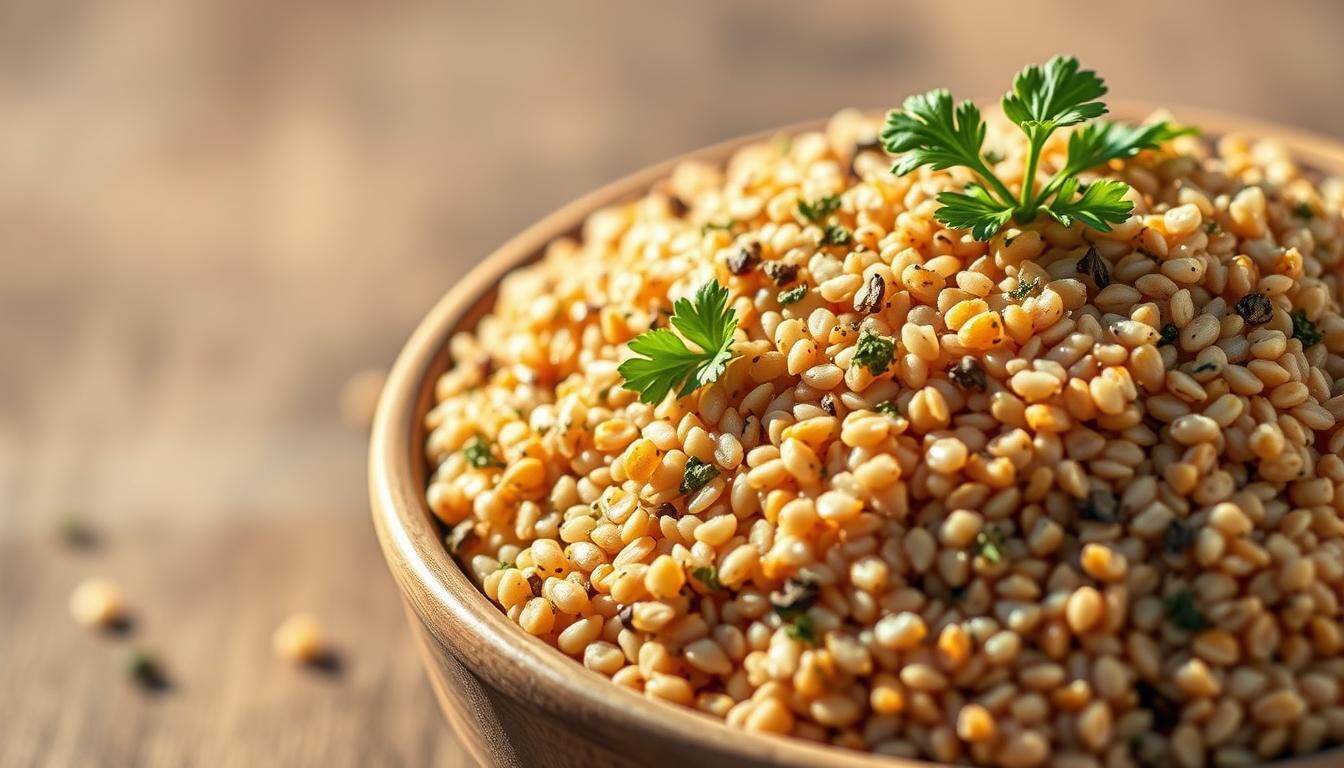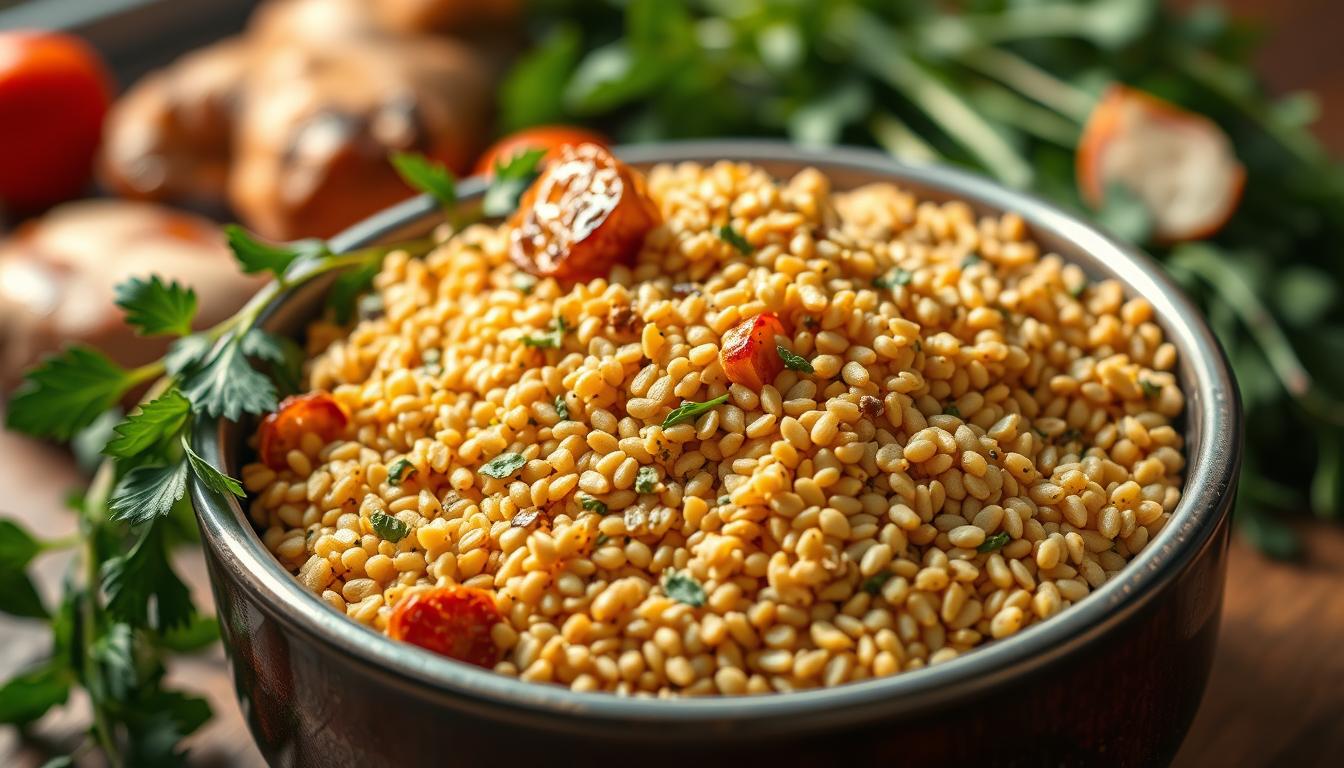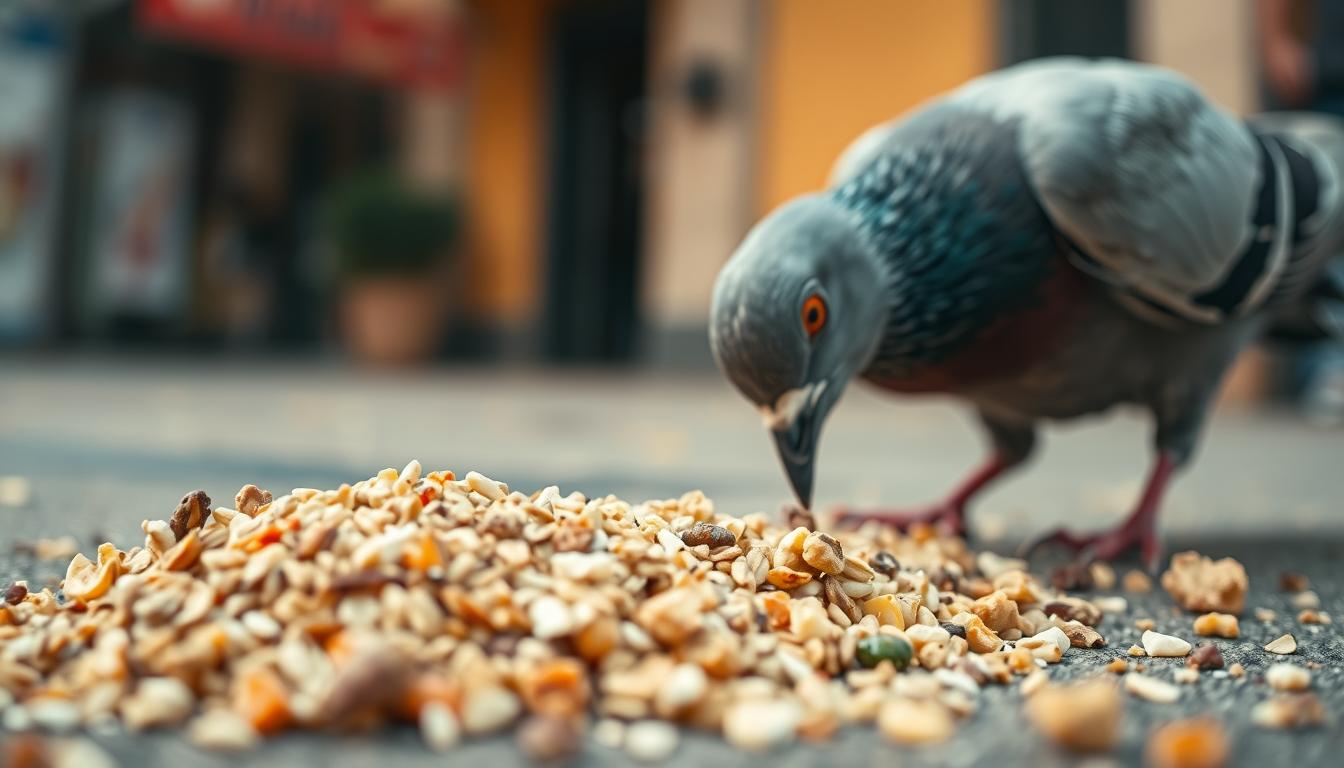Has your dog suddenly stopped showing interest in their meals? It’s a situation that can be quite distressing for any pet parent. While many dogs can be picky eaters at times, a sudden loss of appetite isn’t something to ignore.
Feeding guidelines are just averages, and what’s normal for one dog might not be the same for another. If your dog’s eating habits change, it’s important to take it seriously. Even if your dog skips a couple of meals, early intervention is key to preventing more serious issues.
In this article, we’ll explore 8 expert-backed methods to help stimulate your dog’s appetite. We’ll also discuss the possible medical and behavioral reasons behind this change in behavior. Remember, proper observation and quick action can make all the difference in ensuring your dog’s health and well-being.
Table of Contents
Understanding the Loss of Appetite in Your Dog
Recognizing when your dog’s eating habits have crossed from normal to concerning is crucial. While dogs may occasionally show less interest in their meals, a noticeable and persistent drop in appetite can signal underlying issues that need attention.
Interpreting Normal versus Concerning Eating Habits
It’s natural for a dog’s appetite to vary slightly from day to day. However, if your dog shows a clear decline in eating over a short period, it’s time to monitor closely. Consistent feeding times can help you track these changes effectively.
Exploring Behavioral and Health-Related Triggers
Behavioral factors, such as stress or changes in routine, can often lead to decreased appetite. Health issues like dental problems or infections may also be at play. Understanding these triggers is the first step toward addressing the problem.
By noting daily differences and maintaining a regular feeding schedule, you can better identify when your dog’s appetite changes are more than just a phase. This awareness is key to ensuring your pet’s health and well-being.
Addressing “dog won’t eat food”: Medical Red Flags
If your dog shows a sudden loss of appetite, it could be more than just pickiness. Certain medical conditions may be the underlying cause, making it crucial to recognize the signs and seek professional advice.
Recognizing Dental and Gastrointestinal Issues
Dental problems, such as broken teeth or gingivitis, can cause pain while eating, leading to reduced appetite. Gastrointestinal issues like infections or parasites can also result in stomach upsets, further deterring your dog from eating. These conditions often manifest with specific symptoms, such as bad breath or vomiting, which are clear signs to consult a vet.
Identifying Systemic Illnesses and Medication Side Effects
Systemic diseases, including cancer or kidney failure, can cause a general decline in health, often accompanied by a loss of appetite. Additionally, side effects from medication or recent vaccinations may also affect your dog’s desire to eat. It’s essential to monitor for these symptoms and contact your veterinarian promptly to address any potential health issues early.
- Broken teeth or gum disease can make eating painful.
- Gastrointestinal infections may cause nausea and vomiting.
- Systemic illnesses like cancer or kidney disease can suppress appetite.
- Medications or vaccines may lead to temporary loss of appetite.
Recognizing these medical red flags early can prevent more severe health complications. Always consult a veterinarian if your dog’s appetite doesn’t improve, especially if accompanied by other concerning symptoms.
Behavior and Environmental Influences on Your Dog’s Eating Habits
Changes in your home environment can significantly affect your dog’s eating habits. Just like humans, dogs can be sensitive to their surroundings, and these changes can lead to stress or anxiety that impacts their appetite.
How Stress and Anxiety Impact Appetite
Stress and anxiety are common emotional triggers that can interfere with your dog’s natural hunger signals. For instance, moving to a new home or introducing a new pet can create an unsettling environment for your dog. This stress often leads to a temporary loss of interest in meals, making it essential to address these emotional factors promptly.
Effects of Routine Changes and Unfamiliar Surroundings
Even minor changes, such as rearranging furniture or altering your work schedule, can disrupt your dog’s eating habits. These shifts in routine can cause confusion and anxiety, leading to inconsistent appetite patterns. Your pup might react by showing less interest in their meals, especially if they associate the change with an uncomfortable environment.
- Stress and anxiety can interfere with a dog’s natural hunger signals.
- Environmental changes, such as moving or new pets, can disrupt eating habits.
- Minor changes, like furniture rearrangement, can cause appetite issues.
- Routine alterations may lead to inconsistent eating patterns.
- Recognizing these triggers early helps manage the problem effectively.
Creating a calm and familiar environment during periods of change can help your dog feel more secure. Understanding these behavioral triggers is as important as addressing medical reasons when your dog’s appetite changes. By acknowledging and managing these emotional and environmental factors, you can help restore your dog’s normal eating habits.
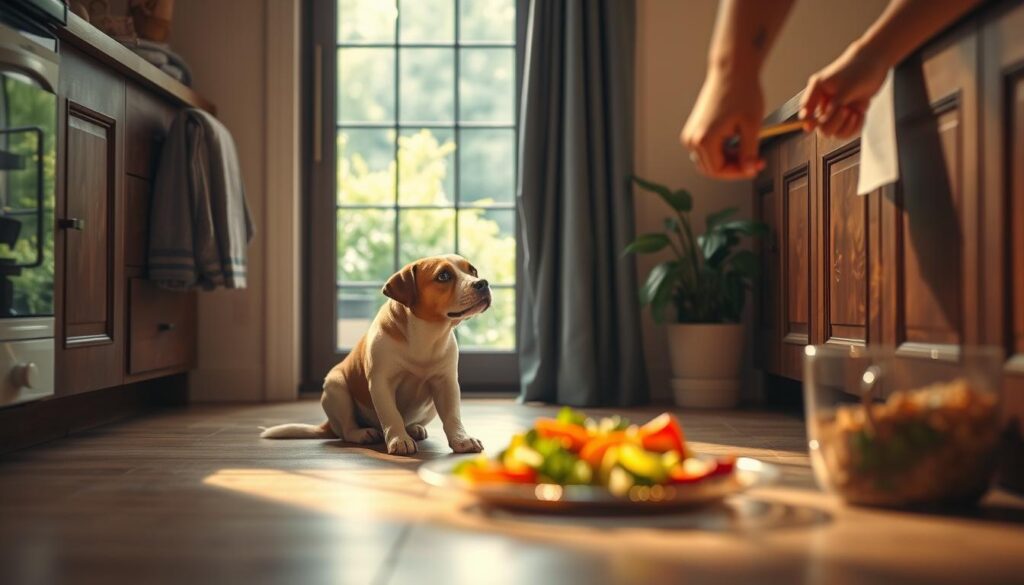
Practical, Vet-Backed Techniques to Stimulate Appetite in Your Dog
Helping your dog regain their appetite can be challenging, but with the right approach, you can make mealtime more appealing. Veterinarians recommend several practical strategies to encourage your dog to eat, focusing on both diet adjustments and environmental changes.
Feeding Adjustments and Structured Mealtime Tips
Creating a consistent routine is key. Start by setting regular mealtimes and reducing distractions during feeding. A quiet, stress-free environment can make a big difference. If your dog is a quick eater, consider using treat-dispensing toys to make mealtime more engaging and stimulating.
- Set a regular feeding schedule to establish a routine.
- Minimize distractions to help your dog focus on eating.
- Use treat-dispensing toys to make meals more engaging.
Enhancing Food Appeal with Warm Water and Attractive Mix-Ins
Adding warm water to your dog’s kibble can enhance the aroma and texture, making it more appealing. You can also try mixing in small amounts of boiled chicken or a probiotic supplement to make the meal more enticing. These small adjustments can make a significant difference in your dog’s interest in their meal.
- Add warm water to kibble to enhance smell and texture.
- Mix in small amounts of boiled chicken or probiotics.
- Introduce gradual changes to avoid upsetting their stomach.
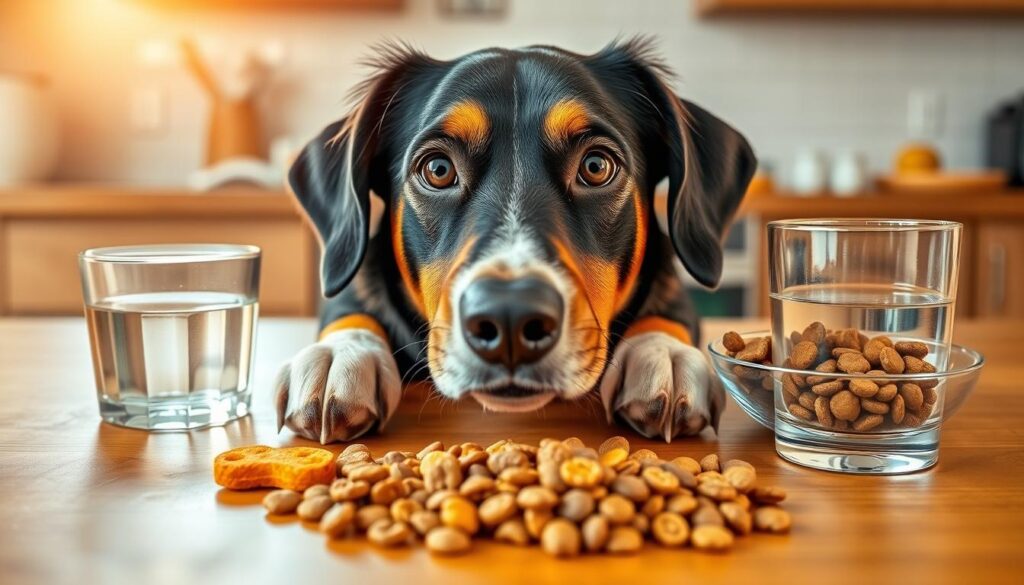
Remember, every dog is different, so it may take some trial and error to find the right approach. If your dog’s appetite doesn’t improve despite these efforts, it’s important to seek professional advice from your veterinarian.
Optimizing Your Dog’s Diet and Meal Times
Ensuring your dog’s meals are both nutritious and appealing is crucial for maintaining their appetite and overall health. A well-structured diet and consistent feeding schedule can make a significant difference in encouraging your dog to eat regularly.
Choosing the Right Dog Food and Portion Control
Selecting high-quality dog food tailored to your pet’s nutritional needs is essential. Look for options with whole ingredients and avoid fillers. Proper portion control is also vital to prevent overfeeding, which can lead to weight gain and loss of appetite.
- Check the sell-by date to ensure freshness.
- Choose food formulated for your dog’s life stage and health conditions.
- Use a measuring cup to portion meals accurately.
Managing Treats to Support a Healthy Appetite
Treats can be a great motivator but should only make up a small part of your dog’s daily calories. Avoid overfeeding with treats, as this can reduce their interest in regular meals.
- Limit treats to training or special occasions.
- Opt for low-calorie, nutrient-rich options.
Keep fresh water accessible at all times to ensure proper hydration. Making meal times more structured and consistent can also help stimulate appetite. Consider warming your dog’s food slightly to enhance its aroma, making it more appealing. If you need to change your dog’s diet, introduce the new food gradually to avoid digestive upset. Tracking your dog’s eating habits helps identify any deviations early on, allowing for prompt action if necessary. Always consult your veterinarian if your dog’s appetite doesn’t improve or if you notice any concerning symptoms.
When to Seek Professional Help and Vet Guidance
It’s natural for a dog’s appetite to fluctuate, but certain signs clearly indicate the need for professional veterinary care. Knowing when to contact a vet can make a significant difference in your dog’s health outcomes.
Recognizing Urgent Signs and Symptoms
If your dog refuses to eat for over 24 hours, it’s a clear red flag. Other concerning symptoms include lethargy, rapid weight loss, vomiting, or diarrhea. These signs often point to underlying health issues that require immediate attention.
Conditions such as dental pain or systemic diseases can manifest subtly. For instance, bad breath or swollen gums might indicate dental problems, while lethargy could signal an infection or organ dysfunction. Don’t wait too long to seek care, as delaying treatment can worsen the condition.
- Complete refusal to eat for more than 24 hours
- Sudden lethargy or lack of energy
- Noticeable weight loss in a short period
- Vomiting or diarrhea
- Bad breath or signs of dental issues
It’s crucial to contact your vet if your dog shows any of these symptoms. A veterinarian can provide tailored advice and treatment plans to address the root cause. Remember, early intervention is key to safeguarding your dog’s long-term health and well-being.
Don’t hesitate to seek professional care if your dog’s appetite doesn’t improve or if they exhibit unusual behavior. Your vet is your best resource for ensuring your dog receives the care they need to thrive.
Conclusion
Understanding why your pup has stopped eating is the first step toward helping them regain their appetite. Whether it’s due to medical issues like dental problems or gastrointestinal infections, or behavioral factors such as stress or routine changes, recognizing the signs early is crucial.
Your vet plays a vital role in diagnosing underlying health issues and providing tailored advice. Simple adjustments, like adding warm water to their meals or using treat-dispensing toys, can make a significant difference. However, if your dog refuses to eat for over 24 hours, it’s a clear sign to seek professional help.
Maintaining a consistent feeding schedule and a stress-free environment can help your dog feel more secure. Monitoring their eating habits and overall behavior is key to identifying any issues early. With the right care and adjustments, your dog can return to their normal eating habits, ensuring their long-term health and well-being.
FAQ
Why would my dog lose their appetite?
A lack of appetite in your pup can stem from various factors, such as illness, medication side effects, dental issues, or even stress and anxiety. It’s important to monitor their behavior and consult a vet if the issue persists for more than a day or two.
What are the signs that my dog’s lack of appetite is serious?
If your dog shows lethargy, vomiting, diarrhea, or weight loss, it’s a red flag. These symptoms could indicate an underlying health condition that needs professional attention. Always contact your veterinarian if you notice these signs.
Can stress or anxiety affect my dog’s eating habits?
Yes, stress and anxiety can significantly impact your dog’s appetite. Changes in their environment, such as moving homes or introducing new pets, can cause them to lose interest in their meals. Providing a calm and familiar space during mealtime may help.
How can I encourage my dog to eat if they’re picky?
Try warming their food with a small amount of warm water to enhance the smell and taste. You can also mix in a little low-sodium chicken broth or a small amount of canned food to make their meals more appealing.
When should I contact a veterinarian about my dog’s eating habits?
If your dog refuses to eat for more than 24-48 hours, it’s time to seek professional advice. A vet can rule out underlying health issues and provide guidance on stimulating their appetite safely.
Can medication cause my dog to lose interest in food?
Yes, certain medications can suppress your dog’s appetite as a side effect. Always discuss potential side effects with your vet and ask if there are alternative options or ways to manage the issue.
How can I prevent my dog from developing poor eating habits?
Stick to a consistent feeding schedule and avoid overfeeding with treats. Ensure their food is fresh and stored properly to maintain its appeal. Regular exercise and mental stimulation can also help maintain a healthy appetite.
What are the best ways to introduce a new dog food?
Gradually mix the new food with their current diet over 7-10 days to prevent digestive upset. Start with a small amount of the new food and increase the proportion daily until the transition is complete.
Can I add anything to my dog’s food to make it more appealing?
Yes, you can try adding a small amount of plain, unseasoned pumpkin or a teaspoon of low-sodium chicken broth to their meals. However, always check with your vet before making any changes to their diet.
How do I know if my dog’s lack of appetite is due to a dental issue?
Look for signs like bad breath, drooling, or chewing on one side of the mouth. If your dog shows these symptoms, schedule a dental checkup with your vet to rule out tooth or gum problems.
What role does water play in my dog’s appetite?
Ensuring your dog has access to fresh, clean water is crucial. Dehydration can reduce their appetite, so always check their water bowl and encourage hydration, especially during and after meals.
Can a change in environment affect my dog’s eating habits?
Yes, moving to a new home or even rearranging their feeding area can cause stress, leading to a temporary loss of appetite. Try to maintain a familiar routine and provide a quiet, comfortable space for meals.
How long is too long for my dog to go without eating?
If your dog refuses to eat for more than 24-48 hours, it’s considered a serious issue. Prolonged fasting can lead to health complications, so contact your vet immediately if this happens.
What are the risks of force-feeding my dog?
Force-feeding can cause stress and potentially harm your dog. It’s best to let your vet guide you on the safest ways to encourage eating without causing additional stress or health issues.
Can treats help stimulate my dog’s appetite?
While treats can be tempting, over-relying on them may reduce your dog’s interest in their regular meals. Use them sparingly and choose low-calorie options to avoid overfeeding.
How can I monitor my dog’s eating habits effectively?
Keep track of their food intake and weight. If you notice a consistent decline in appetite or weight loss, consult your vet to address any potential underlying issues early on.
What are the best times of the day to feed my dog?
Feeding your dog at consistent times, such as in the morning and evening, can help establish a routine. Avoid feeding close to bedtime to prevent digestive discomfort and maintain a healthy schedule.
Can I feed my dog table scraps to encourage eating?
While an occasional, healthy treat like carrots or green beans is fine, table scraps can disrupt their diet and lead to pickiness. Stick to their balanced dog food for the best nutrition.
How can I tell if my dog is dehydrated?
Check for signs like dry gums, sunken eyes, or reduced elasticity in their skin. Encourage water intake by placing multiple water bowls around the house and adding a small amount of low-sodium broth to their meals.
What are the best ways to store my dog’s food to keep it fresh?
Store their food in an airtight container in a cool, dry place. Avoid leaving their meals out for too long, as this can cause the food to spoil and lose its appeal to your dog.
Can my dog’s appetite change with the seasons?
Some dogs may eat less in warmer months due to reduced activity levels or heat-related lethargy. Ensure they have plenty of fresh water and monitor their food intake to maintain a healthy weight.
How can I help my dog regain their appetite after an illness?
Offer small, frequent meals and consider adding a small amount of warm water to their food to make it more appealing. Always follow your vet’s recommendations for post-illness care.
What are the best high-appetite dog foods available?
Consult your vet to find the best food for your dog’s specific needs. Brands like Hill’s Science Diet and Royal Canin offer high-quality options that cater to different dietary requirements.
Can I use a feeding puzzle to stimulate my dog’s appetite?
Yes, feeding puzzles can make mealtime more engaging and stimulate their natural foraging instincts. This can help encourage eating in dogs who are otherwise uninterested in their food.
How can I ensure my dog is getting enough nutrients if they’re not eating well?
Consult your vet about adding a nutrient-rich supplement to their meals. They can recommend options that are safe and effective for maintaining your dog’s health during periods of low appetite.
What are the risks of switching my dog’s food too often?
Frequent changes can cause digestive upset and lead to pickiness. Stick to a consistent, high-quality food and consult your vet before making any changes to their diet.
Can my dog’s appetite be affected by age?
Yes, senior dogs may experience a natural decline in appetite due to reduced activity levels or age-related health issues. Monitor their eating habits closely and discuss any concerns with your vet.
How can I prevent my dog from becoming a picky eater?
Avoid introducing too many different foods or treats, as this can create preferences. Stick to a consistent, balanced diet and limit treats to prevent pickiness.
What are the best ways to handle a dog that refuses to eat kibble?
Try mixing a small amount of wet food or adding a little warm water to their kibble to make it more appealing. If the issue persists, consult your vet for advice on alternative options.
Can my dog’s appetite be affected by certain breeds?
Some breeds are naturally more food-motivated than others. However, any significant change in appetite should be evaluated by a vet to rule out underlying health issues.
How can I ensure my dog is comfortable while eating?
Provide a quiet, distraction-free area for meals and ensure their bowl is at a comfortable height. For older dogs or those with joint issues, consider a raised feeding stand to reduce strain.
What are the best ways to handle a dog that eats too quickly?
Use a slow-feeder bowl or add large ice cubes to their meals to pace their eating. This can help prevent digestive discomfort and make mealtime more enjoyable for your dog.
Can I add probiotics to my dog’s food to improve appetite?
Yes, probiotics can support digestive health and improve appetite in some dogs. However, always consult your vet before adding any supplements to their diet.
How can I tell if my dog is eating enough?
Monitor their weight, energy levels, and overall health. If you notice any changes, consult your vet to ensure they’re receiving the proper nutrition for optimal health.
What are the best ways to store my dog’s food to prevent spoilage?
Keep their food in an airtight container in a cool, dry place. Avoid exposing it to heat or moisture, as this can cause the food to degrade and lose its appeal to your dog.
Can I feed my dog at any time of the day?
While flexibility is possible, establishing a consistent feeding schedule helps regulate their digestion and appetite. Aim to feed your dog at the same times each day for the best results.
How can I ensure my dog’s food is fresh?
Check the expiration date before purchasing and store the food properly. If your dog shows a sudden disinterest in their meals, it may be a sign that the food has gone bad.
What are the best ways to transition my dog to a new food?
Gradually mix the new food with their current diet over 7-10 days to prevent digestive upset. Start with a small amount of the new food and increase the proportion daily until the transition is complete.
Can I feed my dog raw food to stimulate their appetite?
While some dogs thrive on raw diets, they can pose health risks if not prepared properly. Always consult your vet before making such a significant change to your dog’s diet.
How can I prevent my dog from overeating?
Use a measuring cup to portion their meals and avoid free-feeding. Monitor their weight and adjust portion sizes as needed to maintain a healthy weight.
What are the best ways to handle a dog that is overweight?
Work with your vet to create a weight management plan, including portion control and regular exercise. Avoid giving treats and focus on providing a balanced, low-calorie diet.
Can I use a timed feeder to manage my dog’s eating habits?
Yes, timed feeders can help regulate your dog’s meals and prevent overeating. They’re especially useful for dogs that tend to gobble their food too quickly.
How can I ensure my dog is drinking enough water?
Place multiple water bowls around the house and change the water frequently to keep it fresh. Adding a small amount of low-sodium broth to their meals can also encourage hydration.
What are the best ways to handle a dog that is underweight?
Consult your vet to rule out health issues and create a plan to increase their calorie intake. High-calorie, nutrient-rich foods may be recommended to help them gain weight safely.
Can I add canned food to my dog’s kibble to make it more appealing?
Yes, mixing a small amount of canned food can make their meals more enticing. However, choose options that align with their dietary needs and avoid overfeeding.
How can I prevent my dog from becoming bored with their food?
Rotate protein sources or flavors periodically, but always introduce changes gradually to avoid digestive upset. You can also try adding a small amount of warm water to their meals for extra appeal.
What are the best ways to handle a dog that refuses to eat after a vaccination?
If your dog loses appetite after a vaccination, offer small, bland meals like plain rice or boiled chicken. Contact your vet if the issue persists for more than a day or two.
Can I use a feeding mat to make mealtime more engaging?
Yes, feeding mats with textured surfaces can make eating more stimulating and help slow down fast eaters. This can also help prevent digestive discomfort.
How can I ensure my dog’s food is free from contaminants?
Purchase food from reputable brands and check for recalls regularly. Store their food in a clean, airtight container to maintain freshness and safety.
What are the best ways to handle a dog that is a picky eater?
Avoid introducing too many different foods or treats, as this can create preferences. Stick to a consistent, high-quality diet and limit treats to prevent pickiness.
Can I feed my dog at any time of the day?
While flexibility is possible, establishing a consistent feeding schedule helps regulate their digestion and appetite. Aim to feed your dog at the same times each day for the best results.
How can I ensure my dog’s food is fresh?
Check the expiration date before purchasing and store the food properly. If your dog shows a sudden disinterest in their meals, it may be a sign that the food has gone bad.
What are the best ways to transition my dog to a new food?
Gradually mix the new food with their current diet over 7-10 days to prevent digestive upset. Start with a small amount of the new food and increase the proportion daily until the transition is complete.
Can I feed my dog raw food to stimulate their appetite?
While some dogs thrive on raw diets, they can pose health risks if not prepared properly. Always consult your vet before making such a significant change to your dog’s diet.
How can I prevent my dog from overeating?
Use a measuring cup to portion their meals and avoid free-feeding. Monitor their weight and adjust portion sizes as needed to maintain a healthy weight.
What are the best ways to handle a dog that is overweight?
Work with your vet to create a weight management plan, including portion control and regular exercise. Avoid giving treats and focus on providing a balanced, low-calorie diet.
Can I use a timed feeder to manage my dog’s eating habits?
Yes, timed feeders can help regulate your dog’s meals and prevent overeating. They’re especially useful for dogs that tend to gobble their food too quickly.
How can I ensure my dog is drinking enough water?
Place multiple water bowls around the house and change the water frequently to keep it fresh. Adding a small amount of low-sodium broth to their meals can also encourage hydration.
What are the best ways to handle a dog that is underweight?
Consult your vet to rule out health issues and create a plan to increase their calorie intake. High-calorie, nutrient-rich foods may be recommended to help them gain weight safely.
Can I add canned food to my dog’s kibble to make it more appealing?
Yes, mixing a small amount of canned food can make their meals more enticing. However, choose options that align with their dietary needs and avoid overfeeding.
How can I prevent my dog from becoming bored with their food?
Rotate protein sources or flavors periodically, but always introduce changes gradually to avoid digestive upset. You can also try adding a small amount of warm water to their meals for extra appeal.
What are the best ways to handle a dog that refuses to eat after a vaccination?
If your dog loses appetite after a vaccination, offer small, bland meals like plain rice or boiled chicken. Contact your vet if the issue persists for more than a day or two.
Can I use a feeding mat to make mealtime more engaging?
Yes, feeding mats with textured surfaces can make eating more stimulating and help slow down fast eaters. This can also help prevent digestive discomfort.
How can I ensure my dog’s food is free from contaminants?
Purchase food from reputable brands and check for recalls regularly. Store their food in a clean, airtight container to maintain freshness and safety.
Source Links
- 8 reasons why your fussy dog isn’t interested in food (and how to fix it) – https://lyka.com.au/blog/why-your-dog-is-fussy
- What to Do When Your Puppy Won’t Eat – https://www.thesprucepets.com/when-puppy-wont-eat-2804789
- Dog Not Eating? Possible Causes and Appetite Solutions – https://www.webmd.com/pets/dogs/dog-not-eating-possible-causes-and-appetite-solutions
- Why Is My Dog Not Eating? Causes and What To Do – https://www.petmd.com/dog/symptoms/why-my-dog-not-eating
- Is Your Dog Not Eating? Here Are 8 Reasons Why – https://www.dailypaws.com/dogs-puppies/dog-behavior/dog-not-eating
- What to Do When Your Dog Won’t Eat | PetPlace.com – https://www.petplace.com/article/dogs/pet-health/dog-health/dog-diet-nutrition/dog-wont-eat-food-will-eat-treats
- What to Do When Your Dog Won’t Eat: Possible Causes & Solutions (Vet Reviewed) – Dogster – https://www.dogster.com/dog-nutrition/what-to-do-when-your-dog-wont-eat
- Dog Not Eating? Common Reasons & How to Help Effectively – https://www.paolivet.com/health/dog-not-eating/
- Dog Won’t Eat Food, But Will Eat Treats? Here’s Why – https://dogsauce.co/blogs/dog-nutrition/why-is-my-dog-not-eating-his-food-but-will-eat-treats?srsltid=AfmBOooXrzQTmH__YMrFp_Os8-ogWY5RCcTqLS66mDPCQfMho3UND_fy
- Why Is My Dog Not Eating? Exploring Causes and Finding Solutions – https://www.thehonestkitchen.com/blogs/pet-food-ingredients/why-is-my-dog-not-eating
- What Do You Feed a Dog With an Upset Stomach? Here Are Some Bland Diet Tips – https://www.dailypaws.com/dogs-puppies/dog-nutrition/dog-food/bland-diet-for-dogs
- DIY Solutions To Stop Your Dog Throwing Up Undigested Food – https://www.dogsnaturallymagazine.com/dog-throwing-up-undigested-food/
- Feeding the Dog with Liver Disease – TuftsYourDog – https://www.tuftsyourdog.com/dogfoodandnutrition/feeding-the-dog-with-liver-disease/
- What to Do When Dogs Stop Eating? – https://noblevetclinic.com/blog/what-to-do-when-dogs-stop-eating
- Dog Not Eating Food: A Guide To Fussy Eaters | Pooch & Mutt – https://www.poochandmutt.co.uk/blogs/health/how-can-i-encourage-my-fussy-dog-to-eat?srsltid=AfmBOorqgQghnC7pQpPjLyiXHfd8kJhlVwL8G7x7-8maDE29Avu4PAGS
- Clackamas Pet Clinic – https://www.clackamaspetclinic.com/site/blog/2024/07/15/dog-not-eating
- What To Do When Your Dog Won’t Eat: A Comprehensive Guide | Fetch Specialty & Emergency Veterinary Centers – https://fetchvets.com/blog/dog-wont-eat/
- Colonial Park Animal Clinic – https://www.colonialparkanimalclinic.com/site/blog/2024/02/15/dog-not-eating
- Why is my dog not eating his food but will eat treats? – https://paworigins.com/blogs/vet-blogs/why-is-my-dog-not-eating-his-food-but-will-eat-treats-understanding-picky-eating
- Why is My Dog Not Eating? – https://petdirect.co.nz/blog/why-is-my-dog-not-eating?srsltid=AfmBOopNORo3ko1xTWYn6dMCljndVF0Tfec73pc2WJ7StKQGIgG9-J7n


